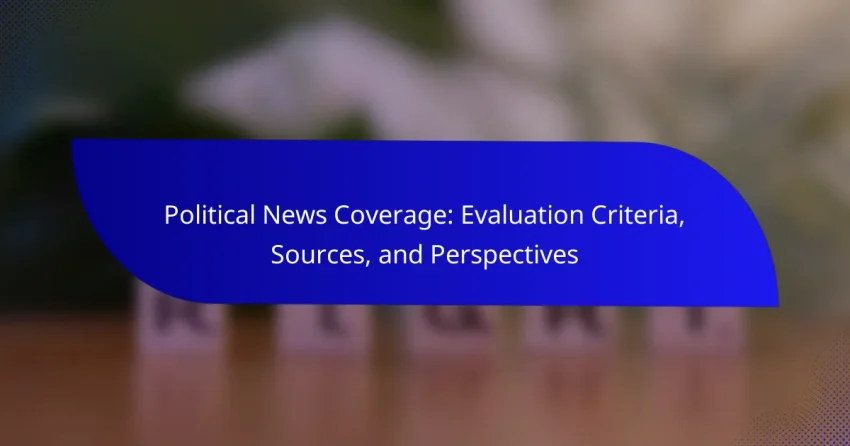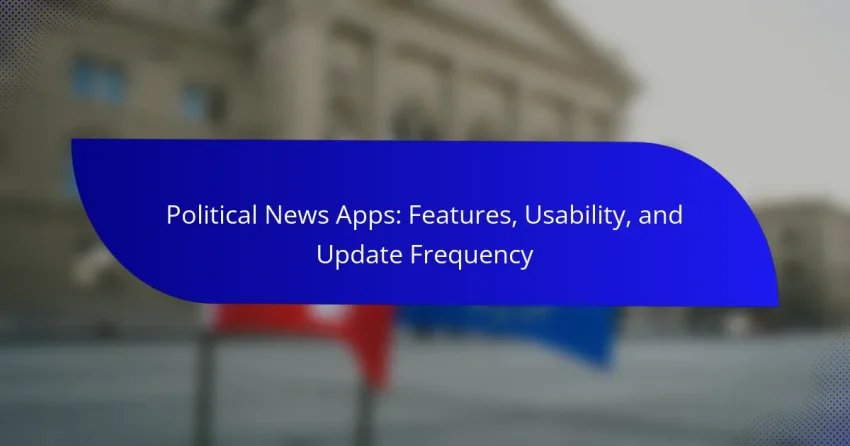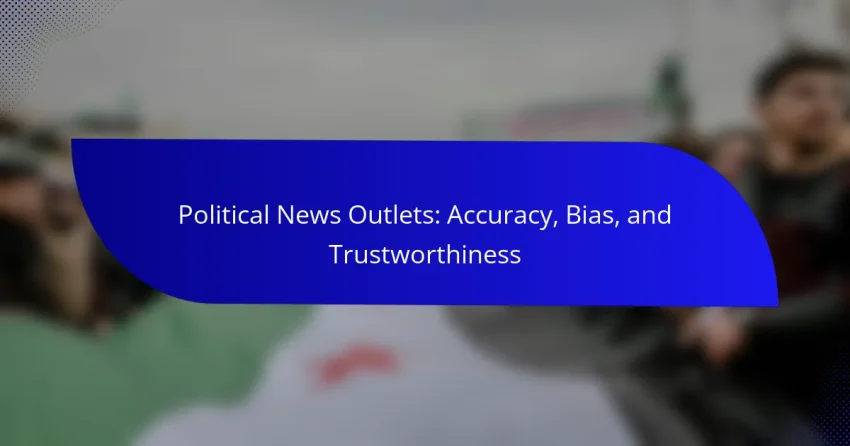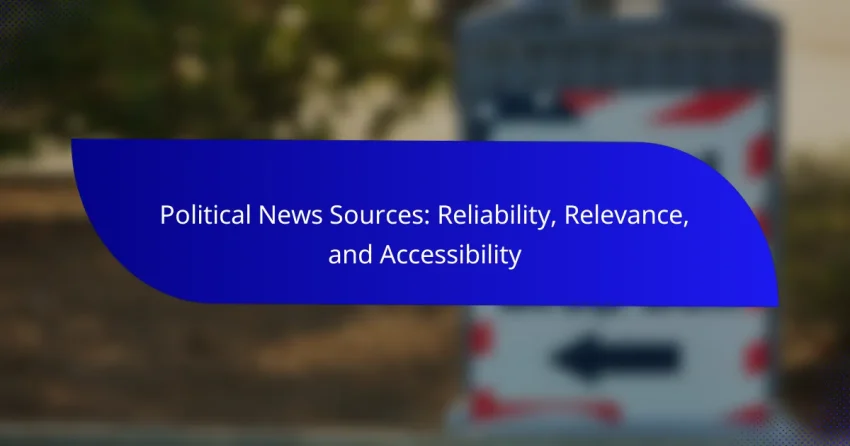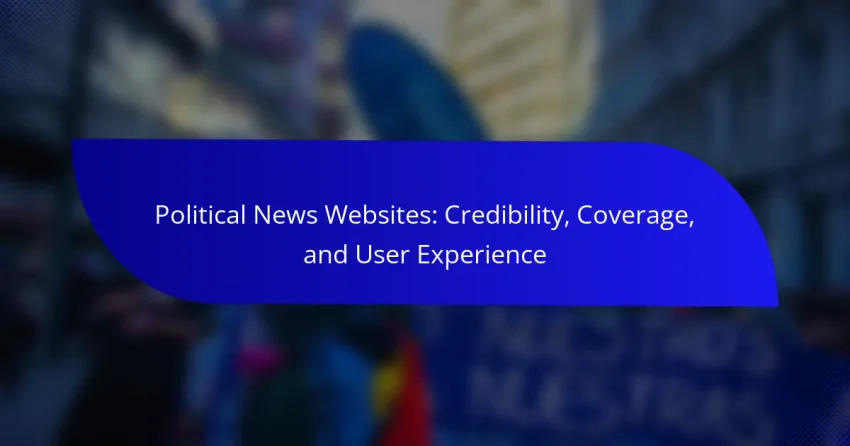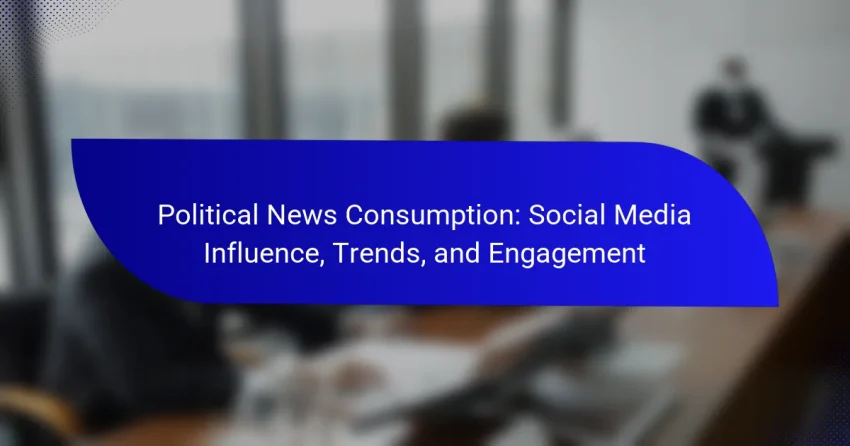Evaluating political news coverage is essential for discerning the reliability and integrity of information. Key criteria such as accuracy, credibility, and bias play a crucial role in helping consumers navigate the complex landscape of political reporting. By understanding these factors and identifying trustworthy sources, individuals can gain a clearer perspective on the political events shaping…
Category: Political News Sources
In today’s fast-paced information landscape, identifying trustworthy political news sources is crucial for staying informed. Outlets known for their commitment to factual reporting and journalistic integrity provide in-depth analysis and diverse perspectives, making them essential for understanding complex political issues. By evaluating sources based on credibility and transparency, you can ensure that the information you consume is both reliable and well-rounded.
Political News Aggregators: Selection Criteria, Features, and User Needs
Political news aggregators serve as essential tools for users seeking to stay updated on the latest developments in politics. By curating articles from a variety of sources, these platforms offer personalized content, real-time updates, and a range of perspectives, ensuring users receive relevant information efficiently. When choosing a political news aggregator, it’s important to consider…
Political News Apps: Features, Usability, and Update Frequency
In today’s fast-paced world, political news apps play a crucial role in keeping users informed about current events. These apps not only provide timely updates and a variety of sources but also feature user-friendly interfaces that enhance engagement. With functionalities like real-time updates, personalized news feeds, and offline access, they ensure that users can stay…
Political News Outlets: Accuracy, Bias, and Trustworthiness
In today’s media landscape, the accuracy and trustworthiness of political news outlets are paramount for informed citizenship. Renowned organizations like The New York Times and BBC News uphold journalistic integrity through rigorous fact-checking and source verification. However, inherent biases in reporting can influence audience perception, making it essential for readers to critically assess the news…
Political News Sources: Reliability, Relevance, and Accessibility
In today’s fast-paced information landscape, evaluating the reliability of political news sources is crucial for informed citizenship. Reliable sources are characterized by their commitment to accuracy, transparency, and journalistic integrity, ensuring that they provide unbiased information. By leveraging various platforms, including mobile applications and social media, individuals can enhance their access to trustworthy political news…
Political News Websites: Credibility, Coverage, and User Experience
In today’s fast-paced political landscape, evaluating the credibility of news websites is essential for informed citizenship. Factors such as fact-checking practices, author qualifications, and transparency play a crucial role in determining the reliability of the information presented. Leading political news outlets offer comprehensive coverage and user-friendly experiences, ensuring that audiences receive timely updates and diverse…
Political News Consumption: Social Media Influence, Trends, and Engagement
The rise of social media has fundamentally altered the landscape of political news consumption, granting users instant access to a wide array of information and fostering greater engagement in public discourse. As digital platforms become the primary source for news, trends reveal a preference for visually-driven and interactive content, particularly among younger demographics. Understanding these…
What Are the Most Trusted Political News Sources?
The most trusted political news sources are recognized for their commitment to factual reporting and journalistic integrity. These outlets often provide in-depth analysis, diverse perspectives, and are widely cited in academic and professional contexts.
The New York Times
The New York Times is a leading American newspaper known for its comprehensive coverage of national and international politics. It offers a mix of breaking news, opinion pieces, and investigative journalism, making it a go-to source for many readers seeking reliable political information.
Readers appreciate its detailed reporting and in-depth analysis, which often includes expert commentary and diverse viewpoints. However, some critics argue that its editorial stance can lean liberal, so it’s beneficial to consult multiple sources for a balanced perspective.
The Washington Post
The Washington Post is another prominent American newspaper that focuses heavily on political news, particularly related to the U.S. government. Its investigative journalism has uncovered significant political scandals and issues, earning it a reputation for accountability reporting.
With a strong emphasis on fact-checking and a dedicated team of political reporters, The Washington Post provides valuable insights into current events. Like The New York Times, it may exhibit a liberal bias, so readers should consider cross-referencing with other outlets for a well-rounded view.
BBC News
BBC News is a globally recognized news organization based in the UK, known for its impartial reporting and extensive international coverage. It provides a broad perspective on political events, making it a trusted source for audiences worldwide.
BBC News is particularly valued for its commitment to neutrality and thorough fact-checking. Its international reach allows for diverse viewpoints, which can help readers understand the global implications of political events.
Reuters
Reuters is a major international news organization that prides itself on delivering accurate and timely news. It is particularly respected for its business and financial reporting, but it also covers political news extensively.
Known for its straightforward reporting style, Reuters aims to provide the facts without sensationalism. This makes it a reliable source for those looking for unbiased political news, although some may find its coverage less detailed compared to other outlets.
Associated Press
The Associated Press (AP) is a not-for-profit news cooperative that supplies news to various media outlets. It is renowned for its fast and accurate reporting, making it a primary source for many journalists and news organizations.
AP’s commitment to factual reporting and neutrality has earned it a high level of trust among readers. Its articles often serve as the foundation for news stories across various platforms, ensuring that the information disseminated is reliable and well-sourced.
How to Evaluate Political News Sources?
To effectively evaluate political news sources, consider their credibility, transparency, and potential biases. This approach helps ensure that the information you consume is reliable and well-rounded.
Fact-checking credibility
Assessing the fact-checking credibility of a news source involves examining its track record for accuracy. Look for organizations that adhere to established fact-checking standards, such as the International Fact-Checking Network’s Code of Principles.
Reputable sources often provide citations for their claims and are transparent about their methodology. For instance, if a news outlet frequently corrects its errors and publishes retractions, it demonstrates a commitment to factual integrity.
Source transparency
Transparency in a news source means clear disclosure of ownership, funding, and editorial processes. Sources that openly share this information allow readers to understand potential influences on their reporting.
Check if the outlet provides information about its editorial team and their qualifications. A transparent source will typically have a dedicated “About Us” section that outlines its mission and values.
Bias assessment tools
Utilizing bias assessment tools can help identify the political leanings of news sources. Websites like Media Bias/Fact Check and AllSides offer ratings that categorize outlets based on their political bias and reliability.
When using these tools, consider cross-referencing multiple sources to get a balanced view. For example, if a source is rated as left-leaning, it may be beneficial to compare it with a right-leaning outlet on the same topic to gain a more comprehensive understanding.
What Are the Best Online Platforms for Political News?
The best online platforms for political news provide timely, accurate, and in-depth coverage of political events and issues. Key sources include Politico, FiveThirtyEight, and Vox, each offering unique insights and analysis tailored to different audiences.
Politico
Politico is a leading source for political news, focusing on U.S. politics and policy. It offers breaking news, analysis, and opinion pieces, making it a go-to for professionals and enthusiasts alike.
The platform is known for its in-depth reporting on legislative developments and electoral politics. Users can access a variety of articles, podcasts, and newsletters that cater to specific interests, such as national security or campaign finance.
FiveThirtyEight
FiveThirtyEight specializes in data-driven journalism, particularly in political forecasting and analysis. It uses statistical models to predict election outcomes and assess public opinion trends.
This platform is ideal for those who appreciate a quantitative approach to political news. It often features articles that break down complex data into understandable insights, helping readers grasp the implications of various political scenarios.
Vox
Vox aims to explain the news with a focus on context and clarity. It covers a wide range of political topics, from policy analysis to cultural commentary, making it accessible to a broad audience.
The platform is particularly effective at breaking down complicated issues into digestible formats, such as videos and explainers. Vox’s emphasis on providing background information helps readers understand the significance of current events in a larger context.
How Do Political News Sources Compare in Coverage?
Political news sources vary significantly in their coverage, focusing on different aspects of political events, ideologies, and audiences. Understanding these differences helps consumers choose sources that align with their interests and information needs.
Comparative analysis of coverage
Political news sources can be broadly categorized into mainstream, independent, and partisan outlets. Mainstream sources often provide balanced reporting, while independent outlets may focus on niche topics or underrepresented perspectives. Partisan sources typically emphasize specific political ideologies, which can lead to biased reporting.
For example, a mainstream outlet like BBC News might cover a political event with a focus on factual reporting, while a partisan source like Fox News may highlight aspects that align with conservative viewpoints. Consumers should consider the source’s editorial stance when evaluating coverage.
Audience reach and engagement
Different political news sources attract varied audience demographics, influencing their engagement levels. Mainstream outlets generally have a broader reach, appealing to a wide range of viewers, while niche and partisan sources may engage smaller, more dedicated audiences.
For instance, platforms like CNN and MSNBC often report higher viewer numbers due to their established presence, while independent sources like The Intercept may have lower reach but foster strong community engagement through social media and interactive content. Understanding these dynamics can help readers select sources that resonate with their political views and engagement preferences.
What Are the Emerging Trends in Political News Reporting?
Emerging trends in political news reporting include a significant shift towards multimedia content and the rise of independent journalism. These trends reflect changing consumer preferences and the evolving landscape of information dissemination.
Increased use of multimedia
The integration of multimedia elements such as videos, infographics, and interactive graphics has become prevalent in political news reporting. This approach enhances storytelling by making complex information more accessible and engaging for audiences.
For example, news outlets often use short video clips to summarize key political events, allowing viewers to grasp essential details quickly. Additionally, infographics can effectively convey statistics and trends, making them easier to understand at a glance.
Rise of independent journalism
Independent journalism is gaining traction as more individuals and small organizations seek to provide alternative perspectives on political issues. This trend is driven by the demand for unbiased reporting that challenges mainstream narratives.
Platforms like Substack and Patreon enable journalists to monetize their work directly from readers, fostering a diverse range of voices. This shift allows for more in-depth coverage of local issues and underrepresented communities, often leading to a richer political discourse.
How to Stay Updated on Political News?
To stay updated on political news, utilize a mix of reliable sources, including news websites, social media, and newsletters. Regularly checking these platforms can help you gain diverse perspectives and timely updates on political events.
Reliable News Websites
Reliable news websites are essential for accurate political information. Look for established outlets like BBC, Reuters, and The New York Times, which have a reputation for thorough reporting. These sites often provide in-depth analysis and fact-checking, helping you discern credible news from misinformation.
Consider subscribing to their newsletters for daily or weekly summaries of political developments. This can save time and ensure you receive curated content directly to your inbox.
Social Media Platforms
Social media platforms like Twitter and Facebook can be valuable for real-time updates on political news. Follow reputable journalists, political analysts, and official government accounts to receive immediate information. However, be cautious of unverified sources and always cross-check facts before accepting them as true.
Engaging in discussions and following trending topics can also provide insights into public sentiment and emerging issues. Just remember to maintain a critical eye on the information shared.
Podcasts and Newsletters
Podcasts and newsletters offer a convenient way to consume political news while multitasking. Many reputable organizations produce podcasts that feature expert interviews and discussions on current events. Subscribing to these can deepen your understanding of complex political issues.
Newsletters from trusted sources can provide curated content and analysis, often highlighting key stories you might have missed. Look for those that focus on political analysis to gain a more nuanced view of the news.
